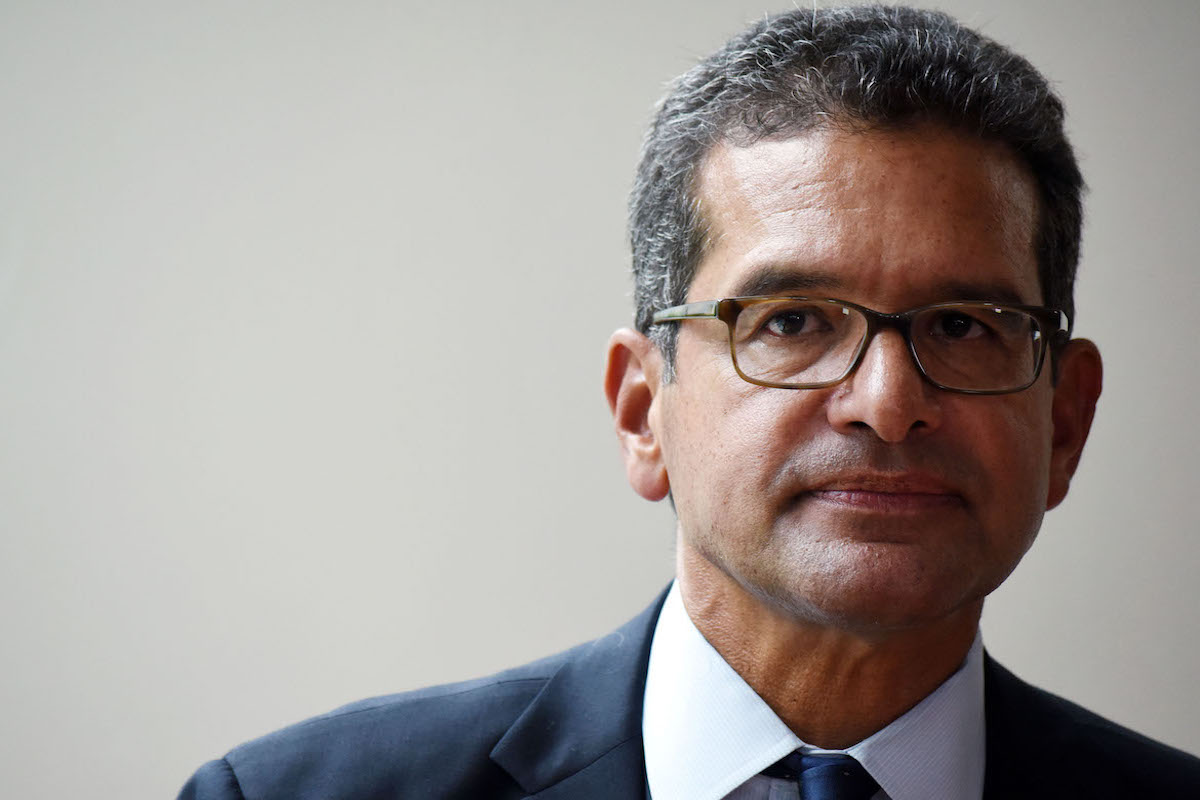

Pedro Pierluisi in 2019 (Photo by Dennis A. Jones/CPI) DENNIS A. JONES METRO PR 31 DE JULIO DE 2019
The video is hard to watch. A cluster of heavily armed and masked police in riot body armor, helmets, and gloves that matched their military watches slap a young woman hard and violently pull a young man from a vehicle for allegedly obstructing justice because the young man yelled opposition slogans at a gubernatorial candidate whose campaign caravan had caused a massive traffic jam.
No, this is not Russia nor is it Chile; this is Puerto Rico. The gubernatorial candidate whose caravan obstructed Sunday traffic was the pro-statehood New Progressive Party (PNP) candidate Pedro Pierluisi and his running mate, Resident Commissioner Jeniffer González, both maskless as COVID-19 cases continue to rise on the island. According to the Health Department, as of Monday afternoon, there are 2,811 confirmed cases and those infected could be as high as 7,199, with 167 dead.
The young man, who has not been identified, was arrested for “not following the agent’s instructions and trying to overtake an intersection controlled by the police,” said Police Superintendent Henry Escalera.
The images are certainly disturbing. The riot police grab the young man by his leg to force him out of the car, tearing his trousers and hitting him while slapping the young woman in the back seat to keep her quiet, as another woman yells in the front of the car to stop the brutality and respect his right to express himself freely.
[VÍDEO] Surge otro vídeo de alegado abuso de fuerza policial, cuando varios agentes intentaron arrestar a un hombre por supuestamente haberle gritado a la caravana de Pedro Pierluisi en Fajardo.
Vea a un agente dándole en la cara a la hija de ambos.
2da parte en prox tuit… pic.twitter.com/efOJ05DP2c
— V. Torres Montalvo ? (@Motinsitepegas) July 13, 2020
After the violent incident, Pierluisi distanced himself from the event by saying it had nothing to do with him and that Puerto Rico knows his style and his respect for others.
“Freedom of expression for all must be recognized no matter what their opinion is. The police must investigate and clarify what we see on social media, which is in no way related to the event of today,” he said. There is an ongoing police investigation.
Yet, the video doesn’t lie; this was not just excessive use of force. It is much more than that. It is a repressive modus operandi that has become synonymous with the PNP and its leadership, most of whom are supporters of United States President Donald Trump.
And this is not the first time in recent weeks that Pierluisi seeks to distance himself from an incident that could hurt his campaign. Remarks he made at a campaign stop smack of racism, especially in light of the death of George Floyd and the rise of Black Lives Matter, and would have ended any campaign in the U.S.
In a recently surfaced campaign video which he says is old, Pierluisi can be heard vehemently saying that in order to pay for his schooling, he “washed dishes, without gloves, with little Black boys whose English I could not even understand.” The word in Spanish he used was “preitito.”
¿Unos prietitos? ¿Esa es la manera en la que Pierluisi habla de personas negras? Estas expresiones demuestran claramente cómo piensa y desnudan su prejuicio. ¿Pq no entendía su inglés? Eran extranjeros o para el sólo los blancos lo hablan bien? pic.twitter.com/FwI0n2TUB3
— Jesus Manuel Ortiz (@jmanuelortiz) June 29, 2020
“Prietito” is not a term of endearment; the diminutive makes the pejorative far worse. Also confusing, Pierluisi was educated in an elite bilingual school on the island, attended Tulane University, studied law at George Washington University, was the Resident Commissioner in Washington and Secretary of Justice in Puerto Rico, with close ties to Washington and Wall Street, so what did he mean by saying that he couldn’t understand the “prietitos” in English?
Later, in a local news program, he dismissed his choice of words by joking that he has always been the token “little Black boy” of his family. Later, he wrote on social media that “to try and attribute a pejorative intention for some statement taken from an audio that is a couple of years old is absurd,” he said.
— Pedro R. Pierluisi (@pedropierluisi) June 29, 2020
“My trajectory against discrimination and equality [sic] is clear and I will not deviate from continuing to deliver my message of wanting to give Puerto Rico a government of excellence,” he said. “I repudiate any intention to inject hate into the public discourse.”
Truth-telling is a hard thing because most people can’t handle the truth. Racism and colorism —a form of prejudice from members of the same race treating people differently based on skin color— exist as a tenant of Puerto Rican culture, but we deny it and argue that our diversity (born of a Spanish, African and Taíno heritage) precludes us from being racist.
The problem with that argument is that it simply is not true. Since Columbus discovered the archipelago, racism has existed in Puerto Rico and it thrives in the very denial of its existence—both by the state and by society. The notion, widely taken for granted, that “we are all mixed” works to make Black people invisible and upholds “lightness” as superior.
By engaging in what comedian Trevor Noah labels “charming racism,” Pierluisi hoped the issue would go away. But, coming from a political family, he knew what he was saying, and that he chooses not to acknowledge it is important.
It should be deeply concerning for anyone, independent of party allegiances, that Pierluisi did not apologize, didn’t recognize the weight of his words, at a time when the profound historical wounds of the nation he professes to admire are open and bleeding.
It is not that he is tone-deaf; he knows full well he couldn’t get away with it in the U.S. But, much like Trump, Pierluisi is counting on his base loving him anyway and finally voting him into La Fortaleza. (He had stormed La Fortaleza after former Governor Ricky Rosselló was ousted, but this proved unconstitutional and he was asked to leave after just a week in the office and Governor Wanda Vázquez took his place.)
Before Pierluisi’s “prietitos” words surfaced, PNP advocate Luis Dávila Colón, one of Puerto Rico’s most prominent radio talk show hosts, was fired by Univision on June 18 after using the N-word on air during Dávila Colón’s June 15 show about La Comay’s anti-Black comments. Detractors said it was used “in context.” Univision did not agree.
The fallout sent shock waves throughout the PNP base, to the point that Pierluisi came to the defense of a PNP legislator who uttered the N-word on the floor of Puerto Rico’s House of Representatives after Dávila Colón’s firing.
Such defenses wouldn’t happen in any U.S. state. They happen, however, in Puerto Rico. And the damage control was clear when in early July, the digital newspaper Noticel, recently bought by lobbyists connected to the PNP and who editorially favor Pierluisi, put out a bizarre “investigative report” that purported to state that racism does not exist in Puerto Rico. All of this to defend Pierluisi’s campaign.
OMG @noticel, this is the dumbest and most ignorant reporting ever. Hiding behind "journalism" to push such a ridiculous argument. How can anyone take you seriously? https://t.co/7ucSIjmAcI
— Julio Ricardo Varela (@julito77) July 6, 2020
Weeks away from the primaries and months from the elections in November and when the other PNP contender, Vázquez, fights serious obstruction of justice allegations, it is important to address Pierluisi’s words and what they mean. Racism and colorism in Puerto Rico is an uncomfortable truth that we need to discuss honestly and openly, not hide from it because it is politically expedient.
And it doesn’t begin in Puerto Rico, for it is endemic throughout Latin America and the Caribbean, ingrained in the culture since colonial times when the Spanish ran their colonies with racial codes. But it could end in Puerto Rico if we elect an enlightened and progressive leadership.
The language Pierluisi used, the tone and the timing of it, is not the language one would want in a leader at any juncture, but surely not in the midst of social and global racial upheaval. Also, the dismissal of his campaign’s role in what is clearly police brutality is a cause for concern.
Puerto Rico, in order to progress as a people and a society, must choose leadership that understands the times we are living and works to divest police brutality, corruption and racism in our culture and advance the island towards its better self.
***




